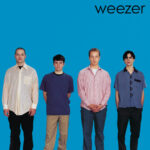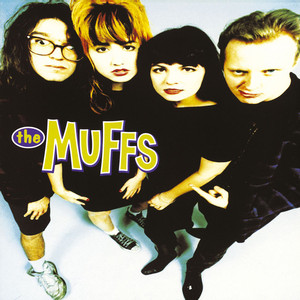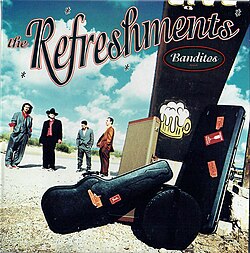 There are songs that define an era, and then there are songs that create one. When Weezer released “Undone (The Sweater Song)” in 1994, it didn’t just arrive as another alternative rock single—it felt like a strangely funny, melancholy, and self-aware transmission from the flannel-clad generation. At a time when grunge ruled the airwaves with angst and attitude, Weezer offered something different: a mix of irony, sincerity, and absurd humor wrapped in the language of loneliness. “Undone (The Sweater Song)” is deceptively simple on the surface, but under its slackened tempo, fuzzy guitar riffs, and offbeat banter lies one of the most brilliantly awkward debut singles of the 1990s. It’s the sound of a band both mocking and embodying the alienation of its time—an anthem for introverts who couldn’t quite find their place.
There are songs that define an era, and then there are songs that create one. When Weezer released “Undone (The Sweater Song)” in 1994, it didn’t just arrive as another alternative rock single—it felt like a strangely funny, melancholy, and self-aware transmission from the flannel-clad generation. At a time when grunge ruled the airwaves with angst and attitude, Weezer offered something different: a mix of irony, sincerity, and absurd humor wrapped in the language of loneliness. “Undone (The Sweater Song)” is deceptively simple on the surface, but under its slackened tempo, fuzzy guitar riffs, and offbeat banter lies one of the most brilliantly awkward debut singles of the 1990s. It’s the sound of a band both mocking and embodying the alienation of its time—an anthem for introverts who couldn’t quite find their place.
Released as Weezer’s first single from their self-titled debut album (known universally as The Blue Album), “Undone (The Sweater Song)” became the band’s unexpected calling card. Produced by Ric Ocasek of The Cars, it introduced listeners to Rivers Cuomo’s peculiar mix of pop craftsmanship, nerdy melancholy, and sardonic humor. The song captured the early ’90s zeitgeist of slackerdom with uncanny precision, a kind of post-grunge shrug that managed to sound both funny and profound. And in the years since its release, it has grown into something more—a time capsule of awkward youth, a beloved singalong, and a foundational piece of Weezer’s mythology.
The Accidental Anthem
“Undone (The Sweater Song)” was written by Rivers Cuomo in 1993, before Weezer had even landed their record deal with Geffen. Cuomo has described the song as his attempt to write “something really sad, like Metallica’s ‘Welcome Home (Sanitarium),’ but it came out all wrong.” That “wrongness” ended up being the song’s genius. Rather than brooding darkness, Cuomo delivered a metaphor so odd it was unforgettable: emotional unraveling depicted through the image of a sweater coming apart thread by thread.
Lyrically, it’s a marvel of simplicity. The opening lines—“I’m me / Me be / Goddamn, I am”—read like nonsense poetry, yet they capture a kind of postmodern disconnection that resonated deeply with Generation X listeners. The verses describe a gathering that’s simultaneously awkward and existential, while the chorus lands like a sigh: “If you want to destroy my sweater / Hold this thread as I walk away.” That line alone made Cuomo one of rock’s most unlikely poets, mixing heartbreak with absurdity in a way that felt fresh and relatable.
Musically, “Undone” operates in contrasts. The verses are slow, subdued, and conversational, while the chorus explodes with distorted guitars and cascading harmonies. Brian Bell and Matt Sharp’s backing vocals soar over Patrick Wilson’s steady drumming, creating a tension between calm and chaos that perfectly matches the song’s unraveling theme. It’s both deadpan and dramatic—grunge filtered through the lens of a Beach Boys fan with a broken heart.
Between Irony and Emotion
By 1994, alternative rock was serious business. Bands like Nirvana, Pearl Jam, and Soundgarden dominated the airwaves with raw emotion and social angst. “Undone (The Sweater Song)” stood out precisely because it refused to play by those rules. Cuomo and his bandmates weren’t screaming about politics or pain; they were singing about emotional awkwardness through a metaphor that sounded like a joke.
And yet, it worked. The humor didn’t undermine the emotion—it deepened it. Weezer’s ability to balance irony and sincerity became their defining trait, and “Undone” was the first, purest expression of that balance. The song invites listeners to laugh at its absurd premise, only to find themselves relating to it moments later. The unraveling sweater becomes a symbol for personal disintegration, for the quiet panic that comes with losing your sense of control.
The middle section of the song—featuring spoken dialogue between two partygoers—is an inspired touch of surrealism. Two friends casually chat about a get-together, blissfully unaware of the emotional collapse unfolding in the song’s subtext. The contrast between their small talk and the aching refrain creates an almost cinematic tension, like a David Lynch scene playing out behind a garage band.
That duality—between the trivial and the profound—made “Undone” one of the most intriguing singles of the decade. It was both parody and confession, both detached and deeply human. It showed that rock music could be funny without losing its soul, and that sadness could wear a smirk.
The Sound of a Generation Coming Apart
The song’s production deserves special credit for its enduring appeal. Ric Ocasek’s influence gave The Blue Album its shimmering polish, but “Undone” still retains the scrappy, garage-band energy of Weezer’s early days. The guitars are crunchy but melodic, the rhythm section tight yet relaxed. Cuomo’s vocal performance is understated, even aloof, but beneath the surface, you can hear the emotion struggling to break through.
That subtle restraint became one of Weezer’s trademarks. Where other alternative bands shouted their feelings, Weezer mumbled theirs—and that understatement became a new form of rebellion. It’s the sound of someone trying to keep it together as everything falls apart.
In 1994, the song found its perfect audience in the college dorms and suburban bedrooms of disaffected youth. MTV gave it heavy rotation, thanks largely to its unforgettable music video—directed by Spike Jonze. The video, shot in a single continuous take, features the band performing in front of a pack of wild dogs. The camera pans and zooms erratically, matching the song’s off-kilter vibe. It was both minimalist and chaotic, funny and mesmerizing, and it cemented Weezer’s status as the cool weirdos of alternative rock.
Jonze’s visual direction turned “Undone” into an instant classic of music video history. It captured the spirit of the mid-’90s perfectly—low-budget authenticity with an undercurrent of surreal humor. The dogs, the stoic band members, the unbroken camera movement—it all added up to something hypnotic. Watching it today still feels like peering into an era where irony and sincerity blurred into one aesthetic.
Cultural Ripples and Lasting Legacy
“Undone (The Sweater Song)” reached #6 on Billboard’s Modern Rock Tracks chart and quickly became a staple of alt-rock radio. But its influence went far beyond the charts. For many listeners, it was their introduction to a new kind of rock band—one that embraced vulnerability, self-awareness, and pop hooks without apology.
Weezer’s debut album would go on to become one of the defining records of the 1990s, but “Undone” remains its emotional and thematic cornerstone. It’s the moment where all of Cuomo’s contradictions—his humor, his loneliness, his pop instincts—collided into something unique. It was the first signal that Weezer wasn’t just another grunge-era band—they were building their own world, one where awkwardness could be an art form.
Over the decades, the song has maintained a powerful connection with fans. It’s a regular feature in Weezer’s live shows, often serving as a singalong moment where entire crowds belt out the chorus with cathartic joy. There’s something eternally relatable about that image of coming undone, of holding on while everything threatens to unravel. Whether you’re a teenager in 1994 or a grown-up reflecting on those years, “Undone” feels like a mirror.
The song has also found new life through covers and references across pop culture. From parody videos to nostalgic playlists, it continues to resonate with new generations discovering The Blue Album for the first time. Its blend of sincerity and absurdity has become a blueprint for countless indie and emo acts that followed—from The Strokes to Death Cab for Cutie to modern-day bedroom pop artists.
The Genius of Rivers Cuomo
Much of what makes “Undone” timeless lies in Rivers Cuomo’s songwriting. He has always been a master of transforming awkward feelings into beautiful melodies, and “Undone” was his first great example of that gift. His lyrics are deceptively simple, yet every line carries emotional weight. His melodies—especially the way the chorus lifts and falls—stick in your head for days.
Cuomo has admitted in interviews that he didn’t fully understand the song’s power when he wrote it. Like many great pieces of art, it came from instinct rather than intention. But looking back, it’s easy to see why “Undone” worked so well: it captures a universal truth in the strangest possible way. Everyone knows what it feels like to come undone, to feel like you’re unraveling—but not everyone would think to express it through a sweater. That’s the quirky brilliance that makes Weezer, and Cuomo in particular, so special.
“Undone” also set the tone for the band’s long and complicated career. Weezer would go on to explore everything from heartbreak (Pinkerton) to pop maximalism (The Green Album, Make Believe), but their debut single remains the emotional compass of their discography. It’s the purest distillation of what makes them great: the ability to make sadness sound fun, and fun sound sad.
Why “Undone” Still Matters
Over thirty years after its release, “Undone (The Sweater Song)” still feels oddly fresh. In an era of hyper-produced pop and digital perfection, its loose structure and conversational tone feel almost radical. It reminds us that authenticity doesn’t have to mean loud emotion—it can also mean quiet weirdness, accidental honesty, and a willingness to sound silly in pursuit of something real.
The song’s enduring charm lies in its contradictions. It’s both a parody of sadness and a genuine expression of it. It’s minimalist yet emotionally rich. It’s grunge-adjacent but entirely in its own world. And above all, it’s human—fragile, funny, and a little out of tune, just like the rest of us.
When Weezer performed “Undone” on Late Night with Conan O’Brien in 1995, the song’s offbeat humor and undeniable melody came through in full force. The band stood stiffly under blue lights, barely moving, while Conan jokingly introduced them as “the next Nirvana.” The performance captured exactly what made Weezer so endearing—they didn’t need to posture. Their awkwardness was their confidence.
Today, “Undone (The Sweater Song)” stands as one of the most iconic debut singles in rock history. It’s the song that made Weezer cult heroes, that helped define the 1990s alternative sound, and that continues to speak to anyone who’s ever felt like they’re coming apart at the seams.
Conclusion: Threads That Never Break
There’s a strange magic in how “Undone (The Sweater Song)” continues to endure. What began as a tongue-in-cheek experiment became a generational anthem, a soundtrack for life’s quiet unravelings. Its humor makes it approachable, its honesty makes it timeless, and its melody makes it unforgettable.
When Rivers Cuomo wrote it in 1993, he couldn’t have known that his odd little metaphor would become a symbol of ‘90s cool. But that’s the beauty of “Undone”—it’s about losing control, about not knowing what’s coming next, and finding grace in that chaos. And as long as people keep feeling a little lost, a little awkward, and a little undone, Weezer’s first great song will always have a thread to pull.


